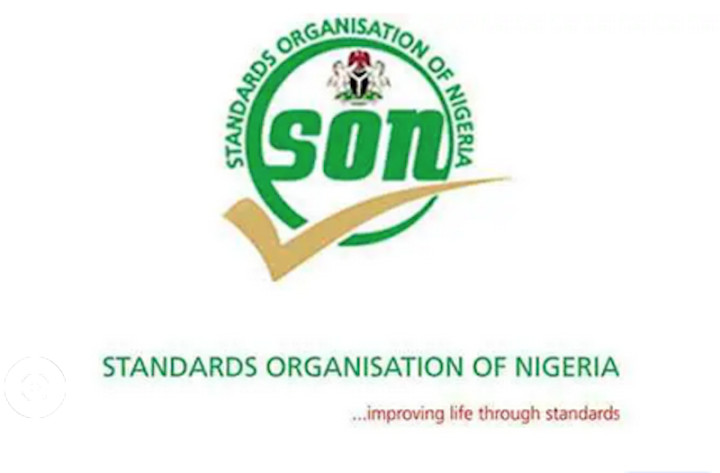The Standards Organisation of Nigeria (SON) has introduced a new certification scheme aimed at improving the quality of Nigerian goods and enhancing the country’s competitiveness in international markets. The initiative, launched in Abuja, is part of SON’s strategic effort to strengthen export standards, reduce product rejection rates abroad, and promote Nigeria’s participation in global trade.
According to SON Director-General, Dr. Ifeanyi Okeke, the new certification framework — known as the “National Export Quality Certification Scheme (NEQCS)” — will serve as a benchmark for verifying that Nigerian products meet global regulatory and safety requirements before being shipped overseas. He said the scheme is designed to help exporters comply with international best practices, boost consumer confidence, and facilitate smoother market access for locally made goods.

Okeke explained that Nigeria’s export potential has long been undermined by challenges such as inconsistent product quality, weak packaging standards, and limited adherence to international certification protocols. The new certification system, he noted, addresses these gaps by introducing a structured and transparent process for product testing, inspection, and certification across various industries.
“This initiative marks a major milestone in our national quest to diversify the economy through non-oil exports. With NEQCS, Nigerian products will now be subject to internationally recognized quality assessments that will eliminate the barriers our exporters face in global markets,” Okeke stated.
He added that the certification scheme would cover key export sectors such as agro-processing, manufacturing, textiles, solid minerals, pharmaceuticals, and engineering materials, ensuring that all products meet the required safety, environmental, and performance standards.
The SON chief emphasized that the scheme is not merely a regulatory mechanism but a capacity-building tool to empower local producers. “Our goal is to make Nigerian goods globally acceptable. We are providing exporters with technical support, laboratory testing, and quality management training to ensure compliance with market demands in Europe, Asia, and North America,” he added.
Exporters who comply with the new certification process will be issued a National Quality Mark (NQM) — a label that signifies adherence to SON’s rigorous quality benchmarks. The NQM will be recognized by trade partners and import regulatory agencies abroad, significantly reducing delays and product rejections at destination ports.
Industry experts have described the initiative as a welcome development that could help address Nigeria’s poor reputation for export quality. According to Dr. Muda Yusuf, an economist and trade expert, the certification program will improve investor confidence and position Nigeria as a credible sourcing destination for high-quality goods.
“For too long, Nigerian exporters have suffered losses due to the rejection of their products overseas. This scheme is timely and will not only protect the reputation of local producers but also expand the country’s non-oil revenue base,” Yusuf said.
He added that if effectively implemented, the certification system could increase Nigeria’s export earnings by billions of naira annually, especially as demand for agricultural and manufactured goods continues to grow in regional and global markets.
The initiative also aligns with the Federal Government’s National Quality Infrastructure Policy (NQIP) and the African Continental Free Trade Area (AfCFTA) objectives, both of which emphasize product standardization as a key driver of economic growth and regional integration.
Speaking on the collaboration aspect, Dr. Okeke revealed that SON is partnering with other government agencies such as the Nigerian Export Promotion Council (NEPC), Nigerian Customs Service, and Nigerian Ports Authority (NPA) to streamline inspection and clearance processes. He also disclosed ongoing engagements with international standardization bodies to ensure that the NEQCS aligns with global conformity assessment systems.
In addition to certification, SON plans to roll out an online verification portal where exporters and foreign buyers can confirm the authenticity of certified products. This digital platform, the agency said, will enhance transparency and help reduce counterfeiting and fraudulent documentation in the export value chain.
Exporters present at the unveiling ceremony expressed optimism that the initiative would significantly reduce the bureaucratic bottlenecks that often hinder Nigerian businesses in the global market. Mrs. Adenike Balogun, an agricultural exporter, lauded SON’s move, noting that the new certification system would help small and medium-sized enterprises (SMEs) penetrate new markets and attract foreign buyers.
“This is a game-changer for Nigerian exporters. With proper certification, our products will be seen as trustworthy and competitive. It will also encourage more investors to participate in the export business,” Balogun said.
The SON boss reaffirmed the agency’s commitment to continuous improvement in standardization and quality assurance, emphasizing that the new certification framework will help Nigeria meet the requirements of international trade agreements.
“Our vision is clear — to make Nigeria’s exports globally accepted, competitive, and sustainable. This certification program will go a long way in boosting our export volume, strengthening our currency, and creating jobs for millions of Nigerians,” Okeke concluded.
With the launch of the certification scheme, stakeholders believe Nigeria is taking a decisive step toward achieving greater economic diversification. As the global market continues to demand higher quality standards, initiatives like SON’s NEQCS could play a crucial role in transforming Nigeria from a raw material exporter into a leading supplier of refined, value-added goods across the world.
Support InfoStride News' Credible Journalism: Only credible journalism can guarantee a fair, accountable and transparent society, including democracy and government. It involves a lot of efforts and money. We need your support. Click here to Donate
